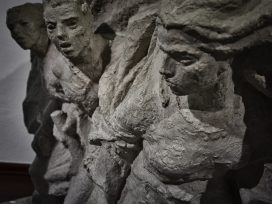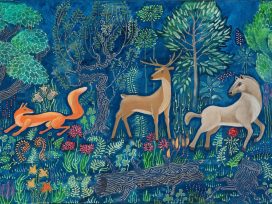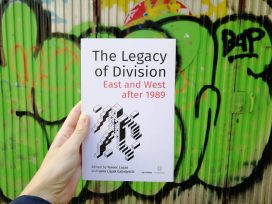Dear Mr President,
Your excellencies,
Distinguished guests, speakers and panellists,
Dear friends and colleagues,
It is a pleasure and a great honor for me to welcome you to the opening of the 22nd European Meeting of Cultural Journals here in Vilnius, one of the two European Capitals of Culture in 2009.
Before I go on to thanking some of the people who have made this conference possible I want to take this opportunity to tell you two stories. Two European stories.
Once upon a time, in Budapest, a young man, an engaged intellectual, was going about his business, working hard to understand and change the world through words. He was the editor of a cultural journal. One day he was invited to an international conference. Eager to discuss literature and art, culture and politics with his colleagues in the West, he was thrilled about the invitation: a real chance for some fresh air.
However, the young man couldn’t go.
Instead he had to find a new hiding place for the manuscripts he had received from his writers. And he needed to figure out how to get paper to print the next issue. Would there be enough on the black market? Without paper they would not be able to publish their next issue. So, he had to postpone the dialogue with his colleagues in the West.
For how long? Well, the story doesn’t tell. One year? Two years? Five years?
Once upon a time, in Istanbul, a young man, an engaged intellectual, was going about his business, working hard to understand and change the world through words. He was the editor of a cultural journal. One day he was invited to an international conference. A well-read man, fluent in English and eager to discuss literature and art, culture and politics with anyone he could get hold of, he jumped at the chance to get to know like-minded colleagues from all over Europe.
However, he couldn’t go.
He tried for months to get a visa to the country where the conference was going to take place, but every time that he supplied the documents that the officials at the embassy had asked for, they would come up with something new. Yet another document. Yet another 450 kilometres-trip from the young editor’s home to the embassy. In the end, it got to much. So, he had to postpone the dialogue with his European colleagues.
For how long? Well, the story doesn’t tell. One year? Two years? Five years?
These are two true stories. More than 20 years separate them in time.
The first took place in 1983, when the circle of editors that later turned into the Eurozine network wanted to invite at least some participants from Eastern Europe to their first meeting in Switzerland.
The second story is from 2009, this year, when the same network – our network – invited our esteemed friends and colleagues from the long-standing Eurozine partner journal Varlik from Turkey to take part in this very conference that we are now opening.
Two years ago, in my inaugural speech at the Eurozine conference in Sibiu, I said that we have come a long way since 1983, when the first European Meeting of Cultural Journals took place in Bossey in Switzerland. The topic of the meeting in Sibiu was normality and I was very proud to be able to point to the fact that at least since the mid-nineties – long before any of the recent “enlargements” – participants from Eastern and Southern Europe no longer appear as anomalies at these meetings, but as perfectly normal people. Or at least as normal as editors, writers and intellectuals can be.
Today, I am sad to say, I am not so sure.
Red tape and contingent visa regulations are being used to pursue old strategies of differentiation and exclusion and are not seldom the manifest symptoms of old and new hierarchies. Not only the financial crisis has made it necessary to, again, address the old concept of an East-West divide.
However – Mr President, ladies and gentlemen – the conclusion cannot be one of resignation. Stories like these, and I could have told you many more, make our endeavour even more important.
We are writing history every day. And we will do so in the next few days as well. The programme of this year’s meeting promises a lot: Starting already this evening with the opening speech by a man who incorporates many of the cultural, intellectual and political developments of the last decades: Mr Antonin Liehm, who as a founder of Lettre International have written European publishing history as well.
The list of speakers, panellists and chairs of the subsequent conference sessions and workshops is just as interesting. However, without the participation of all the editors, writers and intellectuals affiliated with the Eurozine network these meetings would be just like any other conference. They are not. Therefore: thank you all for coming!
Which brings me to the part where I would like to thank at least some of the people and institutions who have made this meeting possible.
First of all, again, the President of the Republic of Lithuania, Mr Adamkus for taking the time to join us tonight and for hosting this opening reception.
The Vilnius: European Capital of Culture 2009 organization; represented here tonight by its director Rolandas Kvietkauskas. In very difficult times you and your staff have showed that you believe in our joint project and have supported it all the way.
Our co-organizer and Lithuanian Eurozine partner Kulturos barai. I will only mention Almantas Samalavicius, who has managed also the most challenging situations during the preparatory phases of the conference.
Of course, my colleagues in the Eurozine office: Veronika Leiner, Simon Garnett, Ine Gundersveen – and Sandra Nalepka who could not come with us to Vilnius but have invested a lot of time and dedication into this meeting.
And finally, as far as the material basis of our endeavour is concerned, the support that we have received within the framework of the cultural programme of the European Commission has been crucial to uphold the network that manifests itself here today.
I wish you a stimulating meeting and controversial discussions. And I hope that those who cannot be with us this time will have the patience and the opportunity to join us again next year.






